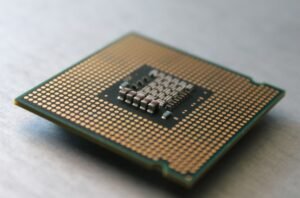Writing vs Typing Memory
Enhancing Memory Through the Written Word
Are you someone who enjoys jotting down notes with a pen and paper, or do you prefer typing away on a keyboard? The way we choose to record information can have a significant impact on how well we remember it. In this article, we will explore the difference between writing and typing when it comes to memory retention and discuss some strategies to enhance your memory.
Key Takeaways:
- Writing by hand improves memory recall.
- Typing is faster but may lead to shallower processing of information.
- A combination of writing and typing can be beneficial for overall memory enhancement.
The Benefits of Writing by Hand
Research has shown that writing by hand helps improve memory recall compared to typing. When we write, we engage different parts of the brain involved in spatial recognition, motor skills, and cognitive processing, which can enhance our ability to remember information. Additionally, the slower pace of writing by hand allows for more focused attention on the content being written, leading to better encoding of the information in our memory.
Interestingly, a study conducted at the University of California found that students who took handwritten notes during lectures performed better on exams compared to those who typed their notes.
The Speed Advantage of Typing
While writing by hand has its benefits, typing offers a notable advantage when it comes to speed. The ability to type quickly allows us to transcribe information at a faster rate, making it a more efficient method for capturing large amounts of information in a shorter span of time. However, it’s important to note that the increased speed of typing may come at the expense of deeper processing of the information being typed.
Combining Writing and Typing for Optimal Memory
Why choose between writing and typing when you can utilize both methods to enhance your memory? By combining writing and typing, you can leverage the benefits of each approach. Writing by hand when you initially learn new information can improve encoding, while typing can be useful for quickly summarizing or organizing your thoughts. This way, you can enjoy the efficiency of typing while still capitalizing on the memory-boosting effects of handwriting.
Research suggests that a combination of both writing and typing can lead to better overall memory performance.
Comparing Writing and Typing Memory
| Writing | Typing |
|---|---|
| Enhances memory recall. | Allows for faster transcription of information. |
| Engages brain regions involved in spatial recognition, motor skills, and cognitive processing. | Requires less cognitive effort for transcription. |
| Improves encoding of information through focused attention. | Offers speed advantage for capturing large amounts of information. |
Strategies for Enhancing Memory
- Consider your learning goals and choose the most appropriate method (writing, typing, or a combination) based on the type and amount of information you need to remember.
- Practice active engagement with the material, such as summarizing in your own words or creating visual aids.
- Establish a regular review schedule to reinforce your memory and prevent forgetting.
- Take breaks during study sessions to allow for consolidation of information in your memory.
- Experiment with different techniques and find what works best for you personally.
Comparing Writing and Typing Speed
| Writing Speed | Typing Speed |
|---|---|
| Approximately 20 words per minute on average. | Typically ranges from 40 to 100 words per minute on average. |
Exploring Further: Handwriting and Cognitive Functions
| Study | Findings |
|---|---|
| Ahrens and Kuczynski, 2013 | Improved working memory performance in children who wrote letters by hand rather than tracing them on a screen. |
| Mueller and Oppenheimer, 2014 | Handwriting promotes deeper processing of information and better conceptual understanding compared to typing. |
| Saperstein and Mu, 2019 | Writing by hand can enhance creativity and idea generation due to the increased activation of the brain’s visual and motor areas. |
Remember, everyone has their own preferences and learning styles, so feel free to experiment with different methods to find what works best for you. Whether you choose to write by hand, type, or use a combination of both, the key is to actively engage with the material and practice regular review for optimal memory retention. So go ahead, grab that pen or keyboard, and start enhancing your memory today!
Common Misconceptions
Writing by Hand vs Typing: Memory
There are various misconceptions surrounding the debate between writing by hand and typing when it comes to memory retention. Many people believe that one method is superior to the other in terms of memory recall and retention, but the truth is more nuanced than that.
- Writing by hand is the best way to remember information.
- Typing is faster and more efficient, but leads to poorer memory retention.
- The act of physically writing engages the brain more, enhancing memory.
One common misconception is that writing by hand is the best way to remember information. While it is true that writing by hand can be beneficial for memory, it is not necessarily a foolproof method. Research has shown that the act of physically writing engages multiple areas of the brain, which can aid in memory retention. However, this does not mean that typing is inherently inferior in terms of memory recall.
- Typing on a computer can be just as effective for memory retention.
- Individual preferences and learning styles can influence memory recall.
- Combining writing by hand and typing can optimize memory retention.
Another misconception is that typing on a computer is less effective for memory retention compared to writing by hand. While typing may not engage the same motor skills as writing by hand, studies have shown that the act of typing can still lead to effective memory recall. Additionally, individual preferences and learning styles can play a significant role in memory retention. Some people may find writing by hand more beneficial, while others may prefer typing.
- Memory is influenced by various factors, such as attention and review.
- Regular practice and repetition are important for memory consolidation.
- Using technology tools can enhance memory recall and organization.
It is vital to understand that memory is influenced by various factors beyond the method of input. Factors such as attention, focus, and review of the material also play a significant role in memory retention. Consistent practice and repetition are essential for memory consolidation, regardless of whether one is writing by hand or typing. Lastly, it is worth noting that technology tools, such as note-taking apps or digital organizers, can aid in memory recall and organization, offering additional benefits that traditional writing may not provide.
Introduction:
Writing and typing are two common methods used for capturing and documenting information. Both techniques have their pros and cons, and they affect our memory in different ways. In this article, we explore the impact of writing and typing on memory by examining various aspects of their functionality and usage.
Table 1: Speed of Writing vs Typing
When it comes to speed, typing generally outperforms writing. According to a study conducted by researchers at the University of Waterloo, proficient typists can type at an average rate of 70 words per minute, while average writers can only manage around 20 words per minute.
Table 2: Cognitive Load Comparison
Writing and typing also differ in their cognitive load. In a study published in the Journal of Educational Psychology, it was found that writing has a higher cognitive load compared to typing. The physical act of forming letters and words with a pen requires more mental effort than simply pressing keys on a keyboard.
Table 3: Memory Encoding Differences
When it comes to memory encoding, writing has the upper hand. A research study at Indiana University Bloomington discovered that students who took handwritten notes during lectures performed better in conceptual understanding and retention compared to those who typed their notes.
Table 4: Accuracy in Note-Taking
While typing may be faster, writing tends to lead to more accurate note-taking. A study from Princeton University found that students who took written notes had a significantly higher level of detail and accuracy compared to those who typed their notes on a laptop.
Table 5: Multi-Sensory Experience
Writing offers a multi-sensory experience compared to typing. The tactile sensation of holding a pen, feeling the texture of paper, and the rhythmic movement of hand-eye coordination can enhance memory formation and retrieval.
Table 6: Typing Efficiency
Typing allows for efficient editing and revision. With the ability to delete, rearrange, and easily make modifications, typing provides a more flexible writing process compared to writing with pen and paper.
Table 7: Access and Portability
Typed documents have the advantage of easy access and portability. Digital files can be stored, transferred, and accessed from numerous devices, eliminating the risk of loss or damage that may occur with handwritten documents.
Table 8: Learning Disabilities Consideration
Writing may pose challenges for individuals with certain learning disabilities like dysgraphia. The physical act of writing can be laborious, leading to frustration and hindering the learning process. In such cases, typing may be a more accessible option.
Table 9: Creativity and Brain Stimulation
Writing engages various areas of the brain simultaneously, stimulating creativity and enhancing idea generation. The physicality of writing encourages free-flowing thoughts and associations, making it a favorable tool for brainstorming and creative writing.
Table 10: Personal Preference and Habit
Ultimately, the choice between writing and typing boils down to personal preference and individual habit. Some individuals may have a strong preference for the traditional feel of pen and paper, while others embrace the convenience and speed of typing.
Conclusion:
In summary, writing and typing impact memory in distinct ways. While typing offers speed, efficiency, and easy access, writing promotes better cognitive load management, encoding, accuracy, and creativity. The choice between the two methods depends on the specific context, the tasks at hand, and individual preferences. As technology continues to evolve, understanding the implications of various writing methods can help us make informed choices that optimize our memory and learning processes.
Frequently Asked Questions
What are the advantages of writing for memory?
Writing helps improve memory as it engages multiple senses and stimulates different regions of the brain. It allows for better processing of information, deeper comprehension, and increased retention.
How does typing affect memory differently than writing?
Typing primarily focuses on motor skills and visual processing, while writing involves motor skills, visual, and tactile processing. Typing may result in shallower processing of information compared to writing.
Can writing improve learning outcomes?
Yes, studies have shown that writing helps improve learning outcomes by promoting active engagement in the learning process, enhancing understanding, and aiding in recalling information during exams or assessments.
Does typing offer any advantages over writing for memory?
Typing offers advantages such as speed and ease of editing, which can be useful in certain circumstances. Additionally, keeping digital records of typed information allows for easier organization and searching.
Is handwriting beneficial for children’s cognitive development?
Yes, handwriting plays a crucial role in children’s cognitive development. It helps with fine motor skills, reinforces letter recognition, and aids in understanding the relationship between letters and sounds.
Does writing by hand help with critical thinking?
Research suggests that writing by hand can enhance critical thinking skills. It encourages deeper reflection, promotes creative problem-solving, and fosters the generation of original ideas.
What impact does typing have on creativity?
Typing can affect creativity differently depending on the individual. Some people find typing more efficient and conducive to their creative process, while others prefer the freedom and expression afforded by writing.
Can writing improve overall communication skills?
Yes, writing can enhance overall communication skills. By practicing writing, individuals develop better grammar, vocabulary, and coherence in their written expression, which can positively impact verbal communication as well.
Is it necessary to completely abandon typing in favor of writing?
No, it is not necessary to completely abandon typing. Both writing and typing have their own merits, and the choice between them depends on the context. It is beneficial to leverage both methods to maximize memory and learning outcomes.
Are there any studies supporting the benefits of writing for memory?
Yes, numerous studies have shown the benefits of writing for memory. Research has demonstrated that the act of writing enhances memory encoding and retrieval processes, leading to better long-term retention of information.



